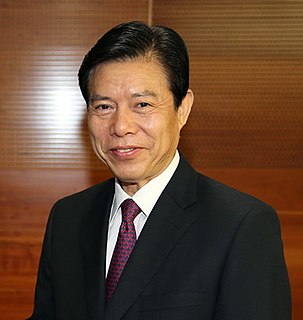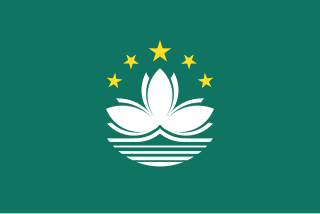The China International Fair for Investment and Trade (CIFIT, simplified chinese:中国国际投资贸易洽谈会, traditional chinese:中國國際投資貿易洽談會), approved by the State Council of the People's Republic of China, takes place on September every year in Xiamen, China. Themed on Introducing FDI and Going Global, CIFIT features a focus upon nationality and internationality, upon investment negotiation and investment policy promotion, upon coordinated development of national and regional economy, and upon economic and trade exchanges across the Taiwan Strait. CIFIT is currently China's only international investment promotion event aimed at facilitating bilateral investment. It's also the largest global investment event approved by UFI.
The China Council for the Promotion of International Trade is a trade body founded in 1952. It also goes by the name of the China Chamber of International Commerce.
The Sino-Japanese Journalist Exchange Agreement is a term that collectively refers to several agreements for a journalist exchange between China and Japan.
Sun Zhonghuan, is a Chinese politician. He is the former Mayor of Hangzhou, Zhejiang Province. He is the current Chairman of the Hangzhou Political Consultative Conference, a largely ceremonial role.
The National Economic and Technological Development Zones are the special areas of the People's Republic of China where foreign direct investment is encouraged. They are usually called the "Economic and Technological Development Zones" or simply the "Development Zones".
Urumqi Foreign Economic Relations and Trade Fair, commonly abbreviated as Urumqi Fair, is an annual trade fair held in Urumqi of Xinjiang, China, since it was started on September 2, 1992. Its purpose is to promote trading and market exploration in Northwestern China with foreign countries mainly in Central Asia. Urumqi Fair is the largest trade fair in Western China.

Hejian is a county-level city under the administration of the prefecture-level city of Cangzhou, in the east-central part of Hebei province, China. As of 2004, the population was ca. 770,000 inhabitants and the city territory was 1,333 km2 (515 sq mi). Hejian is situated along China National Highway 106.
China National Pharmaceutical Group Corp. (CNPGC) known as Sinopharm is a Chinese state-owned enterprise. The corporation was the indirect major shareholder of publicly traded companies Sinopharm Group, China Traditional Chinese Medicine. Shanghai Shyndec Pharmaceutical and Beijing Tiantan Biological Products.

Qingshan District forms part of the urban core of and is one of 13 districts of Wuhan, the capital of Hubei province, People's Republic of China. On the right bank of the Yangtze, it borders the districts of Wuchang to the southwest and Hongshan to the east and south, except for Tianxing Island which lies due north of Qingshan; on the opposite bank it borders Jiang'an.

Xialu District is an administrative district of the prefecture-level city of Huangshi, Hubei province, People's Republic of China. It is a fairly small industrial and residential district, located to the west of Huangshi's downtown Huangshigang District. Since changes in May 2011, the district has been divided into four township-level divisions.

The Midwest-China Hub Commission (MCHC) is a public-private trade collaboration among St. Louis and Missouri governmental officials, business associates and China.
Xiang Junbo is the former chairman of the China Insurance Regulatory Commission (CIRC).
He Jiacheng is a former Chinese academic and public official. Between March 2013 and October 2014 he served as the executive vice president of China National School of Administration. He was dismissed from his position in October 2014, suspected of corruption.
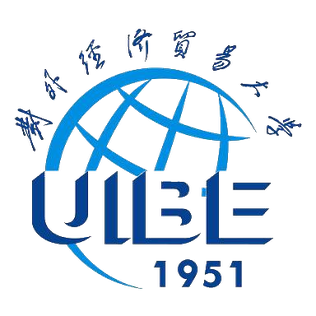
The University of International Business and Economics, is a national public research university specialized in economics, finance, management, law and foreign languages established in 1951 in Beijing, China.
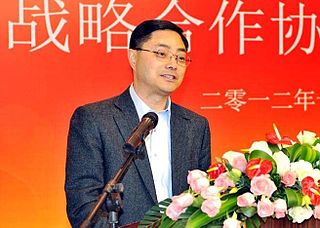
Zhu Yuchen, also known as Eugene Zhu, is a Chinese business executive and one of the explorers and founders of the Chinese futures market. He is the former CEO of Dalian Commodity Exchange (DCE) and China Financial Futures Exchange (CFFEX). He is also the former Chairman of the China Futures Association (CFA).
Dr. Guo Peiyuan, who holds a Ph.D. in Management from Tsinghua University, is the general manager of SynTao and chairman of SynTao Green Finance. Dr. Guo Peiyuan continuously focuses on research and practices about corporate social responsibility (CSR) and socially responsible investment (SRI), with abundant experience on research, training and consulting services.
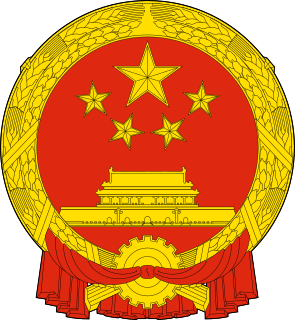
The Ministry of Natural Resources is a ministry of the government of the People's Republic of China which is responsible for natural resources in the country. It was formed on 19 March 2018, taking on the responsibilities of the now-defunct Ministry of Land and Resources, State Bureau of Surveying and Mapping and State Oceanic Administration, with additional responsibilities coming from other departments and ministries.
Zheng Tuobin is a Chinese retired politician. He served as Minister of Foreign Trade (1981–1982), Deputy Minister of Foreign Economic Relations and Trade (1982–1985), and Minister of Foreign Economic Relations and Trade (1985–1990).

Jiang Xiaojuan is a Chinese economist and politician. She is a Professor and Dean of the School of Public Policy and Management of Tsinghua University, and a research professor at the Chinese Academy of Social Sciences (CASS). She is a Standing Committee Member of the National People's Congress (NPC) and Vice Chairperson of the NPC Social Construction Committee, taking charge of lawmaking, revision, enforcement, and supervision of social insurance, sports, protection of women's and children's rights and others. She was elected President of the Chinese Public Administration Society in 2019.



